江苏省南京市第六中学高二英语M6Unit 3《Understanding each other》Grammar学案
高二英语Module 6《Unit 3 Understanding each other》Word power课件
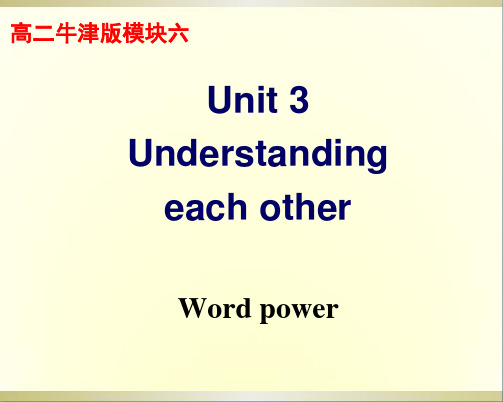
Read the passage in Part A and try to fill in the form
language
French German
categories of words
food, entertainment, jobs
tools, machines, snacks, geological terms
Idioms
as strong as a horse Don’t worry. John will carry the box as strong as a horse . for you. He is __________________
as busy as a bee
She never stops for a second. She is always ________________. as busy as a bee
At weddings in the West, they have confetti which people throw over the bride and groom. This is an Italian ______ word. Italy was famous for the development of _____ music and opera in the 18th century, so many words about music and opera are borrowed from Italian. Additionally, words for military jobs, for example, colonel, also come from Italian.
高二牛津版模块六
江苏省南京市第六中学高二英语M6Unit 3《Understanding each other》Project学案
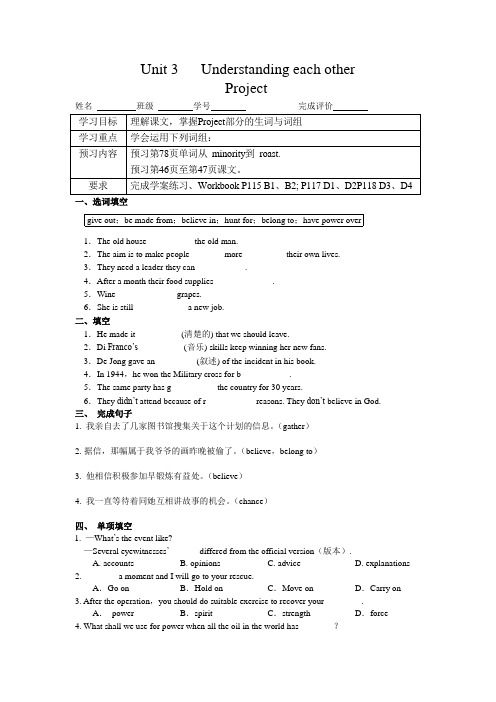
Unit 3 Understanding each otherProject姓名班级学号完成评价一、选词填空give out;be made from;believe in;hunt for;belong to;have power over1.The old house __________ the old man.2.The aim is to make people _______ more _________ their own lives.3.They need a leader they can ___________.4.After a month their food supplies _____________.5.Wine _____________ grapes.6.She is still____________ a new job.二、填空1.He made it __________(清楚的) that we should leave.2.Di Franco’s __________(音乐) skills keep winning her new fans.3.De Jong gave an _________(叙述) of the incident in his book.4.In 1944,he won the Military cross for b___________.5.The same party has g__________ the country for 30 years.6.They didn’t attend because of r___________ reasons. They don’t believe in God.三、完成句子1. 我亲自去了几家图书馆搜集关于这个计划的信息。
(gather)2.据信,那幅属于我爷爷的画昨晚被偷了。
(believe,belong to)3. 他相信积极参加早锻炼有益处。
牛津译林版高中英语选修六Unit3Understandingeachothe

Unit3 Understanding each other Task1教材:牛津高中英语(模块六)高二上学期文档内容:教学设计—教案单元:Unit 3 Understanding each other板块:Task 1Thoughts on the design:Task板块的主要目的是写一封关于解释文化误解的道歉信。
本节课的主要目的是听读结合,引导学生在完成任务的进程中利用英语,并以各类任务的形式培育学生听、说和读的技术。
该节课的内容是以解释文化误解为主线,要求学生将听到的和读到的材料转换成填空的形式,让学生在教学活动顶用英语参与和完成各类真实而成心义的任务,从而培育获取信息的能力。
为了达到那个目标咱们能够分以下三步来走,但这节课只要完成一半任务Step1:为了写这封信第一要获取信息(SKILLS BUILDING1),这部份教会学生如何找到有效信息,能够利用step1里面的材料Teaching aims:After learning this part, the students will be able to:1.listen to two dialogues to fill in the blanks;2.read a passage to find out the taboos;3.understand the cultural differences;4.develop listening and reading ability.Teaching procedures:Step 1: Lead in (PPT4)Today we’ll comple te a text by listening. Before that, we should make it clear that what we should do before and after listening and how we use the skills in practice.Answer the following questions by reading the guidelines on P42.Before listening:What is the first thing we need to do before listening? Why should we do this?What should we do next?How can we decide what the missing words p robably are?What is the fourth point about?After listening:What do you think we should do after we have finished a passage? [Explanation]通过问问题的形式将书上的任务指导展示给学生,然后将重点拿出来放在课件上,如此学生对如何通过听来完成上下文就超级清楚。
牛津译林版高中英语选修六模块6Unit3UnderstandingeachotherReading课件

1. What does Thanksgiving celebrate? It’s to do with celebrating the first harvest after the settlers from Europe went to live in the USA.
2.What is the typical food at Thanksgiving? The huge turkey.
Similarities: throwing confetti
Differences: Italy: the guests
the newly weds
Presents?
UK: the guests the newly weds
Detailed reading
Differences in wedding reception in Brunei?
2. Where do they come from?
3. Where did this dialogue take place?
Listen to the dialogue quickly and then answer several questions.
1. How many people are involved in this dialogue? Who are they?
Multiple choices
1)Ma Li came to the chat room to______. A. make some new friends B. look for some native English
teachers C. collect some information D. practice English
高二英语Module 6《Unit 3 Understanding each other》Task课件
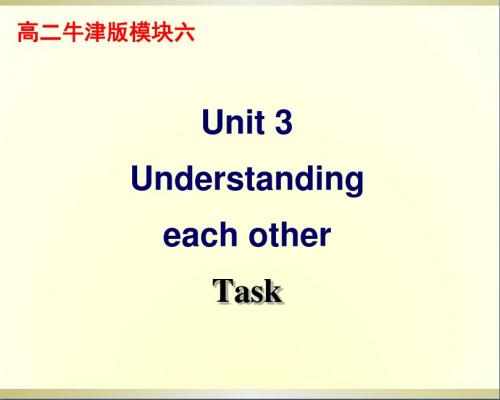
• Decide if it is content words or grammar words that you are listening for.
Step 1: showing foreign visitors around
1. What do you know about cultural misunderstanding? 2. Can you give some examples? 3. Read the diary in Part A and try to guess what the subject of the text and what each of the missing words is by using the methods you have learnt in Skills building 1.
Mr. Takashi enjoyed the Forbidden City and asked so many questions. He spent lots of money ongifts (6)_______. I have no idea what he will do with them all and it took up a lot of time. He seemed to give business out a lot of cards (7)_____________ and got a bit upset when my classmate just put it in his pocket without looking at it.
Finally we went to the Summer Palace. There was a boat we could go on, but Mr. Hudson said that it crowded I thought there was too (9) ________. was lots of (10) ______ space on it. Even with these incidents, I think showing visitors around is a great way to improve our English and hopefully we can do it again next year.
江苏省南京市第六中学高二英语M6Unit 3《Understanding each other》Reading学案
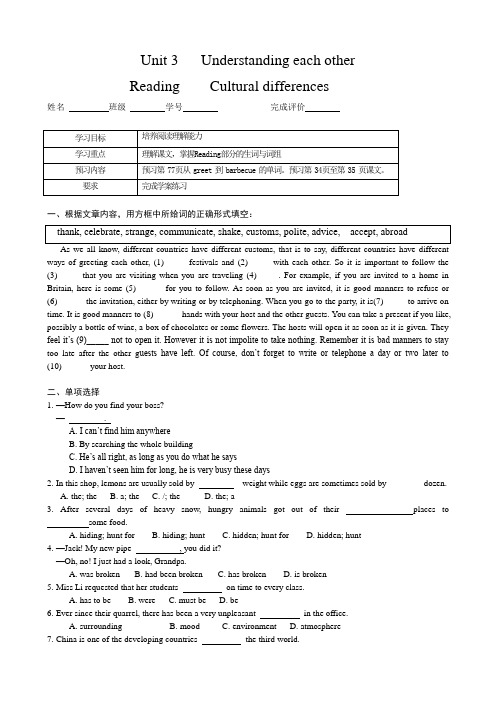
Unit 3 Understanding each otherReading Cultural differences姓名班级学号完成评价一、根据文章内容,用方框中所给词的正确形式填空:ways of greeting each other, (1)_____ festivals and (2)_____ with each other. So it is important to follow the (3)_____ that you are visiting when you are traveling (4)_____. For example, if you are invited to a home in Britain, here is some (5)______ for you to follow. As soon as you are invited, it is good manners to refuse or (6)______ the invitation, either by writing or by telephoning. When you go to the party, it is(7)_____ to arrive on time. It is good manners to (8)______ hands with your host and the other guests. You can take a present if you like, possibly a bottle of wine, a box of chocolates or some flowers. The hosts will open it as soon as it is given. They feel it’s (9)_____ not to open it. However it is not impolite to take nothing. Remember it is bad manners to stay too late after the other g uests have left. Of course, don’t forget to write or telephone a day or two later to (10)______ your host.二、单项选择1. —How do you find your boss?—.A. I can’t find him anywhereB. By searching the whole buildingC. He’s all right, as long as you do what he saysD. I haven’t seen him for long, he is very busy these days2. In this shop, lemons are usually sold by weight while eggs are sometimes sold by________ dozen.A. the; theB. a; theC. /; theD. the; a3. After several days of heavy snow, hungry animals got out of their places to _________ some food.A. hiding; hunt forB. hiding; huntC. hidden; hunt forD. hidden; hunt4. —Jack! My new pipe , you did it?—Oh, no! I just had a look, Grandpa.A. was brokenB. had been brokenC. has brokenD. is broken5. Miss Li requested that her students on time to every class.A. has to beB. wereC. must beD. be6. Ever since their quarrel, there has been a very unpleasant in the office.A. surroundingB. moodC. environmentD. atmosphere7. China is one of the developing countries the third world.A. belonging toB. belongs toC. is belonging toD. are belonging to8. The professors present at the meeting exchanged a few in a low voice when the chairman made a speech.A. remarksB. commentsC. opinionsD. suggestions9. If I were to have time, I to the theatre tomorrow evening.A. should goB. would have goneC. had goneD. were to go10. It makes no sense to refer to the dictionary each time you news words in reading.A. deal withB. come up withC. meet withD. do with11. All the students are very fond of their teacher, as she treats each student .A. cruellyB. generallyC. carelesslyD. equally12. If you late, you would have caught the first bus.A. won’t beB. haven’t beenC. aren’tD. hadn’t been13. —Did you the meeting yesterday?—No, we all the couples in their wedding party.A. join; attendedB. join; took part inC. attend; attendedD. attend; joined14. No satisfactory was given to these phenomena.A. accountB. planC. accentD. mark15. If John his legs in the last training, he would join in the coming World Cup, which he has been longing to compete in.A. didn’t hurtB. hadn’t been hurtC. wasn’t hurtD. hadn’t hurt16. —Good afternoon, sir, this is Blue Sky Hotel.—Hello, I’d like to book three tables for a birthday party tomorrow evening.—A. What can I do for you?B. Just a minute.C. What’s the matter?D. At your service.17. —What’s events like?—Several eyewitnesses’ differed from the official version of events.A. accountsB. opinionsC. adviceD. explanations18. The chair was too weak to Mr. Smith.A. hold upB. take upC. give upD. turn up19. To all the people here the honor for the success.A. belong toB. belongs toC. belongD. belongs20. —My computer has broken down.—Why not ask Nick for advice? He’s an expert in the .A. fieldB. landC. subjectD. topic三、请认真阅读下列短文,并根据所读内容,在规定的字数范围内,回答下列5个问题。
牛津版高中英语选修6 Unit 3 Understanding each other- reading课件(共27张PPT)

with their___f_ir_s_t_fi_n_g_e_r__.
however
in Brunei
cause _o_f_f_e_n_s_e_ They use
thumb
Fill in blanks with proper words:
misunderstanding or offence. ◆ understand others better.
Discussion
Nowadays, western festivals such as Christmas and Valentine’s Day are gaining popularity in China. What do you think of the phenomenon? Should we celebrate foreign festivals?
In Brunei, you have to __ta_k_e__o_f_f__shoes before _e_n_t_e_ri_n_g__ someone's house, _w_h_i_c_h_ many foreigners have trouble getting accustomed to.
Module 6 Unit 3 Understanding each other
In China, how do we greet each other?
Nod head Shake hands
Say hello
Phone
various ways of greeting
Smile Wave
Bow
Hugthe UK源自Open the present the moment he is given it.
苏教牛津译林高中英语模块6_Unit3要点详解:Reading部分

Module6 Unit3要点详解:Reading部分1. Today I would like to talk to you guys and try to accumulate some more information about cultural differences because I have to do a piece of homework on cultural differences.今天我想和伙伴们谈谈,收集一些关于文化差异方面的东西,因为要做有关文化差异方面的作业。
1) accumulate: gradually get more and more Vt. 积累,聚集Reading is a good way to accumulate our knowledge.阅读是积累知识的好办法。
We must accumulate enough evidence to ensure his guilt.我们必须收集足够的证据来确定他的罪行accumulation: n.He is experienced in the accumulation of data. 他在收集资料方面有经验2) difference: n.差异点,不同之处Could you explain to me the differences between British English and American English? 你能给我解释下英美英语的区别吗?There is not much difference in colour. 在颜色上没有多大差别。
The two vases are so alike that I can’t tell the differen ce.这两个花瓶太想像了,很难分辨Whether he comes or not will make a big difference.他来不来有很大影响。
高二英语Module 6《Unit 3 Understanding each other》Readi

There is also an interesting story about cultural differences, i.e., ‘The British teacher who opened the present as soon as he received it at the end-of-the term ceremony.’ Understanding the use of examples can help us understand a text.
高二牛津版模块六
Unit 3 Understanding
each other
Reading
Presentation
Check students’ homework by asking students to present what they have found about cultural differences.
2. What should you do instead of pointing with your first finger in Brunei? Pointing with your thumb.
2. What should you do instead of pointing with your first finger in Brunei? Pointing with our thumb.
Answers to C1 on page 36
2019-2020年高中英语选修6Unit3Understandingeachother--Sect

2019-2020年高中英语选修6Unit3Understandingeachother--Section3Weletotheunit1. Look at the pictures below and discuss the following questions with your partner. (P33)看下面的图画, 并与你的搭档讨论下面的问题.1) belowadv. 1) at or to a lower level, position or place 在或向较低处She looked down from the mountain to the valley below.2) under the surface 在地下The captain told the sailors to go below.prep. Lower than; under 在…下;低于Children below the age of 16 are not allowed to enter.2) followingadj. next (to be mentioned) 随后的The child was sick in the evening, but on the following day he seemed well again. prep. after an event or as a result of 在…之后Following the speech, there will be a few minutes for questions.2. In the Middle East, Arabs greet each other by touching noses. (P33) 在中东, 阿拉伯人的见面礼是互相碰鼻子.touchvt. 1) be or e together with 9sth. else) so that there is no space between 接触,触及One of the branches was touching the water.2) make (sb./sb.s feelings) sympathetic or sad 感动(某人); 触动(某人的感情)We were all deeply touched by his tragic experience.温馨提示:最好仔细阅读后才下载使用,万分感谢!。
高中英语 module 6 Unit 3 Understanding each other教案 牛津版选修6
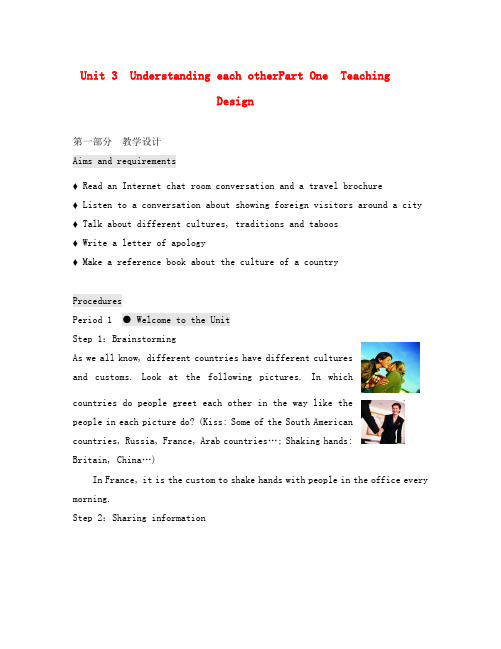
Unit 3 Understanding each otherPart One TeachingDesign第一部分教学设计Aims and requirements♦ Read an Internet chat room conversation and a travel brochure♦ Listen to a conversation about showing foreign visitors around a city ♦ Talk about different cultures, traditions and taboos♦ Write a letter of apology♦ Make a reference book about the culture of a countryProceduresPeriod 1 ● Welcome to the UnitStep 1:BrainstormingAs we all know, different countries have different culturesand customs. Look at the following pictures. In whichcountries do people greet each other in the way like thepeople in each picture do? (Kiss: Some of the South Americancountries, Russia, France, Arab countries…; Shaking hands:Britain, China…)In France, it is the custom to shake hands with people in the office every morning.Step 2:Sharing informationLook at the following pictures and read the captions under them .Can you match the ways ofgreeting with thecountries?Country/Area Waysof greetingHollandputting their hands together and bowing slightlyThailand kissing each other on one cheek and then the other The USA greeting each other by touching nosesSouth America hugging each otherThe Middle East shaking hands with each otherJapan bowing to each otherWhat about an Arab and a Japanese meeting for the first time? As a Chinese, if you are not familiar with greetings from other countries, what might happen?(Maybe we would feel embarrassed; we might be involved in awkward situations lik e…)Step 3: Discussion1.Do you know of any other ways of greeting that people around the worlduse?2.People in different countries greet each other in different ways. Why?3.Can you think of any other customs that are different in different partsof the world?Step 4: Homework1.Search more information about different ways of greetings and some uniquecustoms in some countries.2.Prepare the Reading part.Period 2-4 Reading Cultural differencesStep 1: Lead-inMany people like chatting on line, especially you students. You must have many e-pals.What do you think of online chat?Do you think it is really a good way to know more things and make more friends?Have you ever experienced any funny things or awkward situations whenchatting with your cyber friends?Now, we will read an Internet chat room conversation. Surely you will know all about these after you read it. Sometimes online chat does benefit us a lot.Step 2: Fast reading for general ideasGo through the passage as quickly as possible and try to find answers to the three questions in part A on Page34. Just focus on and identify the information needed to answer these questions.Step 3: Detailed reading for important information.1. Let’s read the passage again and complete Parts C1 and C2 on page 36.Step 4: Practice1. Let’s complete Part D (Refer to the text while complete part D) AnswersD 1d 2c 3f 4g 5b 6e 7h 8a2. Now, let’s read Ma Li’s diary abou t her chat room discussion. Fill in blanks with correct words.E 1)traditions 2)Thanksgiving 3)harvest 4)Europe5)celebrate6)weddings 7)embarrassing 8) presents 9)rude 10) thumb Step 5: Post-reading activities1. Now let’s make up a dia logue by using the questions in Part F on Page 37. Work in pairs for a few minutes and then present your dialogue to the whole class.2. There are also cultural differences in different English-speaking countries. For example:Americans enjoy a good sense of humour; the British take a somewhat different view and believe a formal approach is the best way; the Australians are more informal and straightforward, often enjoying a good laugh and calling their close friends or new acquaintances by their first names.3.Discussion:What might happen if people had no idea of othercountries’ cultures?Do you think it might result in embarrassment oninconvenience?What do you think about “culture shock”?4.Do you know more information about cultural differences?➢In most countries, nodding your head up and down means ‘yes’.➢In some parts of Greece and Turkey, however, this motion can mean ‘no’.➢In South-east Asia, nodding your head is a polite way of saying ‘I’ve heard you.’➢In the United Stated, when someone puts his thumb up, it means ‘Everything is all right.’ However, in Sardinia of Italy and Greece, the gesture is insulting and should not be used there.Step 6:Language Points1.greet sb (with sth)She greeted us with a smile. 她以一个微笑跟我打招呼。
高二英语Module6 Unit3 Understanding each other教案 牛津版 教
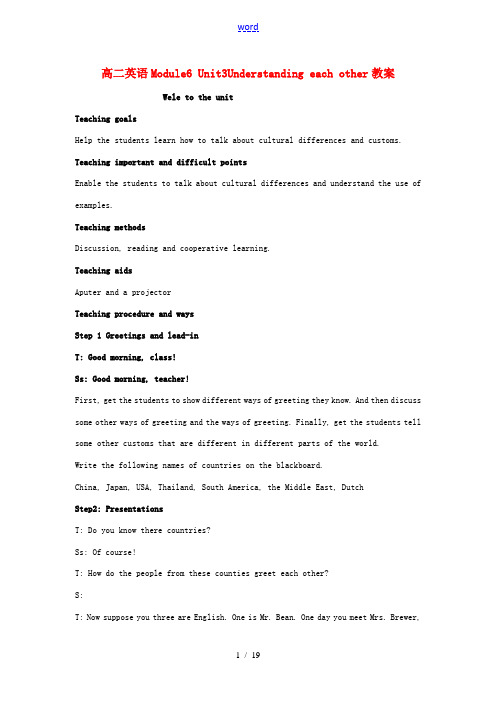
高二英语Module6 Unit3Understanding each other教案Wele to the unitTeaching goalsHelp the students learn how to talk about cultural differences and customs. Teaching important and difficult pointsEnable the students to talk about cultural differences and understand the use of examples.Teaching methodsDiscussion, reading and cooperative learning.Teaching aidsAputer and a projectorTeaching procedure and waysStep 1 Greetings and lead-inT: Good morning, class!Ss: Good morning, teacher!First, get the students to show different ways of greeting they know. And then discuss some other ways of greeting and the ways of greeting. Finally, get the students tell some other customs that are different in different parts of the world.Write the following names of countries on the blackboard.China, Japan, USA, Thailand, South America, the Middle East, DutchStep2: PresentationsT: Do you know there countries?Ss: Of course!T: How do the people from these counties greet each other?S:T: Now suppose you three are English. One is Mr. Bean. One day you meet Mrs. Brewer,one of your students, and her husband in the street. Please work in groups to make a dialogue. Any volunteers?S:T: You did a good job.S:T: Very good, another group?S:T: You are so excellent! A few days later, you meet again. How will you greet each other? Who’d like to act out the situation?S:T: Excellent! Do you know how people greet each other in these countries? Please work in groups of three to show the ways of greeting, one explains, the other two show us. Any volunteers?T: Are your ways right? Please turn to page 33. Look at the pictures. Besides theses ways, do you know of any other ways of greeting thatpeople around the world use? S:T: Why do people in differentcountriesgreet each other in different ways?S:T: Because their customs are different. Can you think of any other custom that is different in diffident parts of the world?Step 4: SummaryT: Today, we have discussed cultural differences and customs. And all of you have done a good job. I feel so happy with you. At the end of this class, I hope every one of you will behave properly if you get the chance to go aboard in the future! Stp5: HomeworkPreview Reading partReadingObjectives:1.To help Ss get a general idea about the text.2. To make Ss bee familiar with the detailed information about the text.3. To help Ss master Reading Strategy.Teaching important points:1.How to make the students understand the passage better.2.How to help the students finish all the exercises.3.How to help the students develop their creative, prehensive and consolidating abilities.Teaching aids: multimedia and blackboardInteraction Patterns: Teachers -class, individuals, pairsProcedures for teaching:Step 1 lead-inAsk students if they think there are differences between Americans and British people and what characteristics make them different from each other. You can begin the activity using the following sentences:People from different places or countries may be very different in some ways. Americans and British people, even though they speak the same language, have very different cultures.When we talk about British people, we may say they:●are a little bit reserved, especially the older generations●don’t talk very much to strangers●respect and are proud fo the traditions and history of Britain●love soccer, rugby and cricketas for the Americans, we tend to think they:●are enthusiastic, open-minded and easy to get along with●do not like to obey others and hate to be flatteredlove American football, baseball and basketballapart from their different characteristics, what are some of the other differences between them? In your opinion, why are there so many differences between them? Step 2 reading-prehensionA read the text quickly and answer the following question.1. Which country is Waled from? __________________________2. Where does Peter e from? ___________________________3. Does everyone in Brunei wear yellow? _________________________Step 3 listen to the tape and answer the following questions:1.What does Thanksgiving celebrate?2.What is eaten at Thanksgiving?3.In the West, when is the polite time to open a present? Why?4.Why do guests expect a present at a wedding in Italy?5.What can you not drink at a wedding in Brunei?6.What should you do instead of pointing with your first finger in Brunei?7.What customs do Chinese cities and Brunei have in mon?Step4 put the subjects of the dialogue in the correct order. Write 1 to 7 in the blanks.Weddings _____________Shoes _____________Presents _____________USA/UK cultural differences ____________An American celebration ____________Colour of clothing _____________Pointing (gestures) _____________Step 5 language points1.accumulate vt/vi 积累He quickly accumulated a large fortune.They set to work accumulating a huge mass of data.堆积, 越积越多If you don’t clear away th e rubbish regularly, it will just accumulate.In course of the years many books had accumulated in the house.A pile of work accumulated on his desk.2.tradition n 传统观念、看法等的总称(不可数)What one thinks and feels is mainly due to tradition, habit and education.It’s part of the tradition of our race一种传统习俗做法 (可数)Celebrating Christmas at Aunt Jean’s is a family tradition.It is a tradition that women get married in long white dresses.代代相传, 传说 (不可数)These songs have been preserved by tradition.According to tradition, the author of the Iliad and Odyssey was a blind poet named Homer.3.all the time一直地 It rained all the time.I kept it all the time to remind me of you.at a time 依次;每次 Take the pills two at a timeat all times 随时;永远We should at all times be aware of our own shortings.We must at all times keep up with changing conditionsat one time 一度, 过去曾经 At one time I lived in Japan.At one time I used to play a lot of sport, but I seem to have lost interest now. 同时(做某事) They all tried to talk at one time.过去大多数中学教师是男性, 但现在女教师比男教师多多了。
最新牛津译林版高中英语选修六unit 3《understanding each other》task1教案.doc
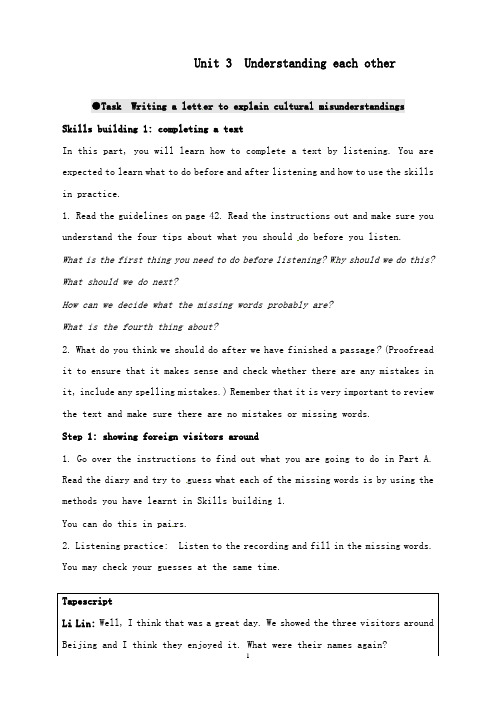
Unit 3 Understanding each other●Task Writing a lett er to explain cultural misunderstandingsSkills building 1: completing a textIn this part, you will learn how to complete a text by listening. You are expected to learn what to do before and after listening and how to use the skills in practice.1. Read the guidelines on page 42. Read the instructions out and make sure you understand the four tips about what you should do before you listen.What is the first thing you need to do before listening? Why should we do this? What should we do next?How can we decide what the missing words probably are?What is the fourth thing about?2. What do you think we should do after we have finished a passage?(Proofread it to ensure that it makes sense and check whether there are any mistakes in it, include any spelling mistakes.) Remember that it is very important to review the text and make sure there are no mistakes or missing words.Step 1: showing foreign visitors around1. Go over the instructions to find out what you are going to do in Part A. Read the diary and try to guess what each of the missing words is by using the methods you have learnt in Skills building 1.You can do this in pai rs.2. Listening practice: Listen to the recording and fill in the missing words. You may check your guesses at the same time.Perhaps he would have preferred beef and onions.asbefore we got on the boat. It was really a pain that he wanted to wa it3. Listen to the tape again and try to answer the following questions:Which tourist attractions did the two students show the three foreigners around? (The Forbidden City and the Summer Palace.)Why did the writer feel strange about Mr Singh?( Because he looked upset when the writer[:Z#xx#k]held out his left hand to shake hands with him.)Where is Mr Singh from?( He is from India.)Where is Mr Takashi from? ( He’s from Japan.)Do you think the OK sign made by Mr Takashi means ‘very good’ or ‘great’?(No.)Why wouldn’t Mr Hudson get on the boat? (He thought it was too crowded.)1.Read the first paragraph of Part B and find out what the word ‘taboo’ means.You can go back to the diary entry in Part A. Then read the rest of the article and circle the taboos in different cultures. Find out the reason why Mr Takashi did not look very happy when the student just put his business card in his pocket.[:学.科.网Z.X.X.K]s5. Read the guidelines in Part C to know what you will do in this part. Listen to the recording toget more information about cultural habits.From my experience, people from the USA often feel uncomfortable ifin theirt business people from Asia have a different idea about a hug. I also noticed that in thSkills building 2: asking questions1. There are many types of questions you can ask. They are as follows:Do you know…?Could you please tell me if/whether…?Please tell me if/whether…Who is…?Please tell me his/her name.When/Where did…?Please tell me when/where…How did…?Do you know how to…?Why did…?Can you tell me the reason why…?2. Read the guidelines on page 44. Make some sentences by using the correct question words.Step 2: asking about cultural differences1. Read the instructions to make sure you know what you are going to do. Work individually to form the eight questions in this part.2. Work in pairs to do the question-and-answer exercise according to what you have read in the magazine article on page 42 and what you have heard in the recording.you should look at the card carefully.Skills building 3: writing a letter of apologyIn this part, you will read about how to write a letter of apology to explain misunderstandings.1. There are differences between writing letters in Chinese and writing letters in English. In a formal English letter, you should first write your address and the date. Here is the format of a letter as an example.Sun Ting from Beijing Sunshine Secondary School wants to write a letter to her friend Tan Yi in Sunsh ine Town: BeijingSunshineSecondarySchoolSunshine Town Beijing 10000088 Sunny StreetSunshine TownBeijing 100000X 。
牛津译林版高中英语选修六Unit 3《Understanding each other》(Task2

牛津译林版高中英语选修六Unit 3《Understanding each other》(Task2)教学设计教材:牛津高中英语(模块六)高二上学期文档内容:教学设计—教案单元:Unit 3 Understanding each other板块:Task 2Thoughts on the design:本节课是以说和写为主的写作课. 在完成上节课听读任务的基础上这节课的要紧目的要完成Step2: SKILLS BUILDING2 要想猎取信息还能够通过说来猎取,如此就自然导出这一步。
Step3得到信息后,要着手写信就要注意书写细节,如此就能够用上SKILLS BUILDING3,最终达到写一封道歉信的目标。
第一通过用wh-questions来训练口语同时通过复习上节课阅读部分的内容为写作积存更多的素材。
在围绕“说明文化误解”这一主题进行了听、说、读训练,为最后写一封道歉信积存了丰富的语言信息,写的目的确实是让学生在猎取信息的基础上去分析信息,处理信息,从而完成最终写的任务。
Teaching aims:After learning this part, the students will be able to:1.ask questions about cultural differences;2.write a letter of apology to explain misunderstanding;3.improve speaking and writing skills.Teaching procedures:Step 1: lead in (PPT4-5)Today the main task of this cla ss is to write an apology letter to explain misunderstanding according to the contents we’v e learned in listening and reading part of Task. But when we want to find out about something, we need to ask questions. Do you sti ll remember how we can ask questions?(We often use wh-questions)What—when we want to find out about something specific.How—when we want to find out the way something shoul d be done.Which—when we want to specify which one of a choice of possibilities. When—when we want to inquire about time.Why—when we want to find out a reason.Where—when we want to find out about the place in which something happened. [Explanation]这一部分选择用任务型教学法,因此一上课就向学生展现本节课的要紧任务是写,但写之前要弄清专门多问题,那么就务必要搞清晰如何样问题。
高三英语复习 Module 6 Unit 3 Understanding each other(二

Module 6 Unit 3 Understanding each other(二)课题:M6U3 第二课时教学目标:通过复习单元重点单词和词组来了解本单元的重要知识点。
教学重难点:通过复习单元重点单词和词组来了解本单元的重要知识点.教学过程集体备课部分(学生活动部分)个性备课部分/学生记录ask 1【自主学习】读3500词unit49ask 2【知识梳理】。
adjust v。
适应,使适应;整理,整顿,安排;调整,调节,校正adjustment n.调整,调节【搭配】根据…调节…使自己适应…adjust to 。
..对…作出调整【练】1) It took several seconds for his eyes to 。
几秒钟以后他的眼睛才习惯了黑暗。
) I’ve the seating plan。
我对座位表作了小小的调整。
)You can any child.你可以根据小孩的高度调节这张桌子.)The body quickly _ change in temperature.身体迅速(自行)调节以适应气温的变化。
)Sometimes being confused can make us withdraw, but it can also motivates to ________ our learning strategy, largely depending on our attitudeowards it。
A. refresh B。
adjust C. accustom D。
accelerate。
celebration n。
庆祝会;庆祝;赞美celebrate v。
庆祝;颂扬【搭配】为庆祝……【练】There will be a party (庆祝)Jane and Dave’s 40th nniversary.【点拨】celebrate指“”;congratulate指“”。
. account n. 说明,解释;叙述,描写,报道;账户v. 认为是【搭配】决不为…理由,为…缘故考虑到解释,说明;占…比例【拓展】意为“决不"的词组放在句首,句中谓语部分需要部分倒装有: .【练】1) They had to when drawing up the plan.他们在起草计划时把各种可能性都考虑到了。
高二英语Module 6 Unit 3 Understanding
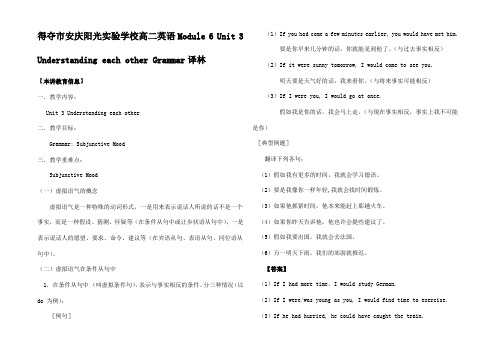
得夺市安庆阳光实验学校高二英语Module 6 Unit 3 Understanding each other Grammar译林【本讲教育信息】一. 教学内容:Unit 3 Understanding each other二. 教学目标:Grammar: Subjunctive Mood三. 教学重难点:Subjunctive Mood(一)虚拟语气的概念虚拟语气是一种特殊的动词形式,一是用来表示说话人所说的话不是一个事实,而是一种假设、猜测、怀疑等(在条件从句中或让步状语从句中);一是表示说话人的愿望、要求、命令、建议等(在宾语从句、表语从句、同位语从句中)。
(二)虚拟语气在条件从句中1. 在条件从句中(叫虚拟条件句),表示与事实相反的条件。
分三种情况(以do 为例):[例句](1)If you had come a few minutes earlier, you would have met him.要是你早来几分钟的话,你就能见到他了。
(与过去事实相反)(2)If it were sunny tomorrow, I would come to see you.明天要是天气好的话,我来看你。
(与将来事实可能相反)(3)If I were you, I would go at once.假如我是你的话,我会马上走。
(与现在事实相反,事实上我不可能是你)[典型例题]翻译下列各句:(1)假如我有更多的时间,我就会学习德语。
(2)要是我像你一样年轻,我就会找时间锻炼。
(3)如果他抓紧时间,他本来能赶上那趟火车。
(4)如果你昨天告诉他,他也许会提些建议了。
(5)假如我要出国,我就会去法国。
(6)万一明天下雨,我们的郊游就推迟。
【答案】(1)If I had more time,I would study German.(2)If I were/was young as you, I would find time to exercise.(3)If he had hurried, he could have caught the train.(4)If you had told him yesterday, he might have made some suggestions.(5)If I were to go abroad, I would go to France.(6)If it should rain tomorrow, our picnic would be put off.2. 省略 if 的条件从句当从句中有 were, had 或 should 时,可省略if ,而把它们放在句首。
牛津译林版高中英语选修六高二英语M6Unit3《Understandingeachother》SectionⅡ课件

名师微博 throughout作为介词的时候可以 和all over和all through互换。
[易混辨析] allow,permit
指作为一项权力或特权而“许 allow 可”,含有默许、不禁止某种
行为的意思。 表示“许可”,常暗示准许者 permit 有绝对的权力去阻止该事情的 发生。
③The guard allowed him to remain there, though it was not permitted.门卫让他留在那 里,虽然这是(规定)不允许的。
巧学活用 1-1单项填空 (1)(2012·上海市崇明中学高三期中) _________ your winning the game.I knew you could _________ them and you _________. A.Congratulation on;won;did B.Congratulations;won;do C.Congratulations on;beat;did D.Congratulation;beat;do
C.congratulate;for D.celebrate;for
解析:选B。congratulate常用搭配为
congratulate sb.on sth.意为“祝贺某人某事”;
celebrate常指庆祝或纪念有意义的日子或事件,
其后常用表示rmit的正确形式填空 (1)Time _p_e_r_m__it_t_in_g__,we’ll discuss the
你要适应地方风俗。adjust oneself to sth.使
自己适应……,固定用法;be present at出
席;参加。
(2)You can’t see well through a telescope
- 1、下载文档前请自行甄别文档内容的完整性,平台不提供额外的编辑、内容补充、找答案等附加服务。
- 2、"仅部分预览"的文档,不可在线预览部分如存在完整性等问题,可反馈申请退款(可完整预览的文档不适用该条件!)。
- 3、如文档侵犯您的权益,请联系客服反馈,我们会尽快为您处理(人工客服工作时间:9:00-18:30)。
Unit 3 Understanding each otherGrammar Unreal conditional姓名班级学号完成评价虚拟语气一、状语从句中的虚拟语气(一) if 引导的条件状语从句1 If I had time, I would attend the meeting.2. If I were you, I should seize the opportunity to go abroad.3. If you had taken my advice, you would not have failed in the exams.4. If he had come earlier, he wouldn’t have missed the first bus.5 If the headmaster came tomorrow, we would have the meeting.6 If it were to rain tomorrow, the sports meeting would be put off.7 If he should make a mistake, you should not blame him.感悟:与现在事实相反1. If I were a doctor, I might save her life without hesitation.2. If I stayed at home now, I could play computer games.译一译: 1.要是他现在在这儿,我们就会问他关于这件事。
______________________________________________________________.2.即使她现在在这儿,她也不能解决这个问题。
______________________________________________________________感悟:与过去事实相反1. If I had earned a lot of money last year, I would have bought a car.2. If the earthquake hadn’t happened in Wen chuan in 2008, many people wouldn’t have lost families.练一练:1. If the farmer hadn’t seen the s nake, he _______________ (not put) it in the arms.2. If he ______________ (not put) it in the arms, the snake wouldn’t have bitten him.3. If the snake _______________ (not bite) him, he________________ (not die).4.If my lawyer ___________(not be here ) last Saturday , he ____________(prevent ) me from going .感悟:与将来事实相反1. In the future, if I had 10,000,000 yuan, I would buy a house.2. If the water in the Pacific Ocean were to be poured out, it wouldn’t stop my love.3. If he should come tomorrow, I would talk to him about it.练一练:1. If everyone _____________ (help) those in need in future, the world would be a much better place.2. If it _________ (be) fine this weekend, we would have a picnic.3. If I _____________ (be admit to) a famous university in two years, I would treat you to a big meal.4. If it _____________(snow) tomorrow, we would go skiing.(二):条件状语的倒装:如果条件状语中有were, had, should时, 可以倒装成:Were / Should / Had +主+其他1. If I were you, I would try it again. ___________________, I would try it again.2. If he had been there yesterday, he would have seen the film._______________ there yesterday, he would have seen the film.3. If it should snow tomorrow, we wouldn’t go out. _____________ tomorrow, we wouldn’t go out.注意:在省略句型中,只有had done 的had 才能省略,实义动词had 不能省。
1If I had time now, I would go to the library. Had I time now, ……. (误)(三).错综时间条件句:假设条件从句谓语动词发生的时间与主句所假设的谓语动词不一致,叫做错综条件虚拟语气。
主句和从句的谓语动词要依照假设的时间而定。
1. If the weather had been fined, the crops would be growing still better.2. If you had followed the teacher’s advice, you wouldn’t be in the hospital.3. If you had come and attended the meeting yesterday, you __________(know) what we are doing now.4. If you __________(take) my advice then, you _________________________(现在就不会有麻烦了)5. _____ her husband _________(kill) in the war, she would not be helping others with housework now.(四):含蓄条件句:有时虚拟的条件不是通过条件句来表示,而是用一些词或短语,如without, but for, or , otherwise等,这种句子叫含蓄条件句。
1. But for electricity ( = If it were not for electricity ), there would be no modern industry.2. Without your help (If it had not been for your help), we could not have succeed.3. I was ill that day. Otherwise, I would have taken part in the sports meet.练一练:填入合适的动词形式。
1)Without air, there ____________no life on the earth. (be)2)He __________________ but for his teacher’s timely advice. (fail)3)We ___________________ the work better in that case. (do)4)He would have come to see you yesterday morning but he _____________an important meeting to attend. (have)当堂训练:1. If you __________ (speak) to him last time you saw him, you __________ (know) what to do now.2. If I ____ (have not ) so much work to do , I __________ (not miss) the film last night.3. If you _________ (hesitate) this moment, you_____ (suffer) in future.4. If Mary ________________________ (arrive) today, she must have started three days ago.5. If it ___________ (snow) last night, it ____________(be) very cold today.6. ---Why didn’t he come?----He ______________but she didn’t have time. (come)7. She would put on weight but she __________(not eat ) enough.8. 如果我早上出门带钱了,现在就不如此尴尬了。
9. 要不是你的帮助,我是不会成功通过考试的。
10. 她感觉不舒服,不然她不会那么早离开会场的。
11. 如果他没有生病并且错过了那么多的课,他就会取得更大的进不了。
12. 如果不是你的建议,我们不可能克服这些困难。
13. 如果不是窗户开着睡觉,你就不会感冒了。
14. 我不知道他的电话号码,否则的话,我就会给他打电话了。
15. 如果不是英语老师的帮助,我们就不可能赢得英语写作竞赛一等奖了。
16.如果我们继续这样折腾地球,我们将来将无立足之地。
单项选择1.Were it not for the snowy weather, we __________all right.A. would beB. would have beenC. wereD. may be2. ________more careful, his ship would not have sunk.A. If the captain wereB. Had the captain beenC. Should the captain beD. If the captain would have been3. If he _________ me tomorrow, I would let him know.A. should callB. should not have been ableC. were not ableD. are not able4. If you asked your father, you ______________ permission.A. may getB. might getC. should have calledD. maybe get5. _____________today, he would get there by Friday.A. Would he leaveB. Was he leavingC. Were he to leaveD. If he leaves6. ______I you, I would go with him to the party.A. WasB. Had beenC. Will beD. Were7. Had Paul received six more votes in the last election, he ____________our chairman now.A. must have beenB. would have beenC. wereD. would be8. If the horse won today, it _____________ thirty races in five years.A. would have wonB. wonC. must have wonD. did have won9. There is a real possibility that these animals could be frightened, _______a sudden loud noise.A. being thereB. should there beC. there wasD. there having been10. If you hadn’t taken such a long time to get dressed, we’d______________ there by now.A. beB. circlesC. is circlingD. be circling11. George would certainly have attended the meeting, ____________________ .A. if he di dn’t get a flat tireB. if the flat tire hadn’t happenedC. had he not had a flat tireD. had the tire not flattened itself12. Without electronic computers, much of today’s advanced technology __________.A. will not have been achievedB. have not been achievedC. would not have been achievedD. had not been achieved13. He was very busy yesterday, otherwise he _____ to the meeting.A. would comeB. cameC. would have comeD. had come14. If I had seen the movie, I ______________ you all about it now.A. would tellB. will tellC. have toldD. would have told15. ________ she ________ yesterday, she would meet the famous singer today.A. If, didn’t leaveB. Had not, leftC. Hadn’t, leftD. Didn’t, leave16. If you _____ smoke, please go outside because this is a non-smoking office.A. mustB. shouldC. canD. may17. If Sanlu Group melamine to the milk, the babies too much from kidney stone.A. didn’t add; would not sufferedB. hadn’t added; wouldn’t have sufferedC. hasn’t added; wouldn’t have sufferedD. hadn’t added; would have suffered18. If the printer_______ break down under guarantee, we would repair it at our expense.A. mayB. couldC. mightD. should19. I ______ the poor rabbit, but I didn’t have the right drugs with me at that moment.A. savedB. had savedC. could saveD. could have saved20. . —But for your timely warning, we into great trouble.—You know we’re friends.A. would getB. must have gotC. would have gotD. couldn’t have got21. --- You promised to come to my dinner party last night but you didn’t turn up.--- I ______, but something unexpected happened just before I left.A. would like to haveB. should like toC. am going toD. like to22. —Pity you missed the lecture on nuclear pollution.—I____ it, but I was busy preparing for a job interview.A. attendedB. had attendedC. would attendD. would have attended。
